Use the Web to Cook Your Books
At some point during the last year, my teen declared that I wasn’t allowed to buy any more cookbooks. We had run out of space in the kitchen, even after a culling session that weeded out some old titles (exotic Jell-O recipes from the middle of the last century won’t be coming back, nor am I likely to cook dinner for dozens). And let me reassure you, my collection is modest compared to many home cooks, maybe a few dozen titles in all.
You're not ready for my jelly, are you pic.twitter.com/vJZRbrIf1t
— 70s Dinner Party (@70s_party) March 1, 2017
But I still run into the cookbook conundrum: finding a recipe involves keeping a mental model in my head of which books contain my favorite recipes, and when that fails, I have to flip through multiple volumes. Even though my library is small, the books are shoehorned into various available corners of my kitchen, so I also need to remember where each one is located. (And are they organized in a sensible fashion? No. Have you met me?)
So, like many people, I often turn to a Google search for recipes. That’s fine—if often overwhelming—but it feels like I’m cheating on my cookbooks, which I purchased because they’re beautiful, informative, and usually tell a story about the chefs or the cuisines they feature. I like cookbooks!
Then I discovered Eat Your Books, a website that combines the searchability and discoverability of modern technology with the richness (and generally higher quality) of printed cookbooks.
Disclosure: You Don’t Eat Any Books
The core of Eat Your Books is an extensive reference database of the contents of over 160,000 cookbooks and food magazines. It won’t show you any actual recipes because, the company says, that would violate copyrights. (That’s not precisely true; lists of ingredients and simple sets of instructions are not copyrightable. However, recipe introductions and creative instructions can be protected. I suspect the company is trying both to support authors and avoid potential litigation.) Instead, you can search for the name of a dish or ingredient and see matching recipes that come from the books you own.
For instance, let’s say I have some spinach that I need to cook before it wilts. At Eat Your Books, I can click My Bookshelf > Recipes in the toolbar at the top, enter “spinach” in the search field, and view all the recipes in my cookbooks that include spinach. Since spinach is such a common ingredient, I can also filter the results, such as narrowing it down to just recipes from India.
When I click a recipe that looks good, Eat Your Books presents me with the cookbook and the page number on which it appears, along with a list of ingredients so I can make sure I have them all on hand. I can add the items to a simple Shopping List view that I can print or bring up in Safari on my iPhone when I’m at the store.
A free Eat Your Books account lets you add up to five books or magazines and an unlimited number of sources for online recipes. A Premium membership, which removes those limitations, costs $3 per month or $30 per year.
Adding a book to your library is speedy. Using the search field under Library > Books, I found nearly all of my cookbooks by typing just partial book titles. You can also enter an ISBN. I was going to make a joke about how I’ve misplaced my CueCat, and how it would be great to scan barcodes if you have a large library… and then I discovered that the Import Books feature does exactly that.
Seeing large book covers as icons is a huge help, such as when I needed to specify that I own the 1997 edition of Joy of Cooking, not earlier or later editions.
Not all of the books in the Eat Your Books library have been indexed. You can still add one to your bookshelf, but you won’t see search results from it. This happens with “books that are unlikely to be indexed by EYB because they are not on sufficient [numbers of] Bookshelves.” In that case, you can click the Request Index link and ask Eat Your Books to add it to the indexing to-do list, or you can request to index the book yourself.
Side Dish Sources of Recipes
Books are the main course, but you can also add food magazines and blogs to your bookshelf. With magazines, you can add each issue as it becomes available or specify that you subscribe to the title to automatically add new issues as they are indexed. To catch up on your back issues, enter a date range of issues. The format is the same: recipe names, ingredients, and page numbers for that issue.
Indexed blogs are in some ways the most interesting part of Eat Your Books because they include a Recipe Online link that takes you to the actual recipe published on the site. Being able to search through a curated set of food blogs is a huge win. There must be hundreds of thousands of them (most telling you at length what Hubby and Precious Child think of their recipes before getting to the actual recipe), rendering the results from a general Google search overwhelming. With Eat Your Books, though, you can restrict your searches to the food bloggers whose taste and expertise you appreciate.
You can also add notes and reviews to recipes on your bookshelf, which can be shared with the greater Eat Your Books community or saved privately in your account. The public notes can be helpful to scan for recipes you haven’t made before, though they still occasionally suffer from comments from people who made numerous radical substitutions but are peeved that the recipe didn’t come out right. Of course, you can bookmark favorite recipes to aid in quickly getting back to them—or at least to their page numbers.
If you run across an online recipe you like, you can use a bookmarklet to add it to your bookshelf. It attempts to scrape the information from the site and pops up a window for you to add other information that wasn’t grabbed. However, the recipe must be approved by Eat Your Books before it goes into the library. I’ve long used the service AnyList for saving recipes, which does a great job. Others at TidBITS are fond of Paprika (see “FunBITS: Paprika Recipe Manager for iPhone, iPad, and Mac,” 14 March 2014).
Feed Your Cookbook Appetite
You can also browse for cookbooks you don’t own. The Eat Your Books home page spotlights books, ingredients, and food-related news, such as a feature on cookbooks that celebrate the cuisine and people of Ukraine. Eat Your Books also features reviews of new titles and lists of best-selling titles from many independent booksellers, including my favorite local all-cookbook book store, Seattle’s Book Larder.
When you’re browsing a cookbook, you can also see how many people have it in their bookshelves, which is a great way to see which titles are popular. The list also reveals how many books the members own—or at least have added to their bookshelves. It’s not uncommon to see people with thousands of titles!
Some cookbooks in Eat Your Books include EYB Previews, which are PDF-like selections containing a few pages to give you a feel for the recipes and look. As you can see, the site also looks great on an iPad.
Unsurprisingly, if you find a book you want, you can buy it using affiliate links that support the site.
A Few Scorched Edges, but Overall a Good Bake
I have only a few criticisms of Eat Your Books. Some older recipes (pre-2015) don’t include page numbers, only cookbook titles. That’s not a major problem, since you can always check the table of contents or index when you actually open the book.
A trivial annoyance is navigation. It would be nice if the home page would display a search field for My Bookshelf > Recipes when you’re logged in. But it’s easy enough to create and use a bookmark to the My Bookshelf page, whose search field does default to Recipes.
These are minor gripes. Although Eat Your Books is a database at its center, its heart is the love of cookbooks shared by its members. The site is trying to make a cook’s life easier and more integrated with the real world, not supplant the beauty and storytelling qualities of good cookbooks. It also helps me get out of ruts where I cook the same handful of dishes from the few cookbooks I can remember and reach.
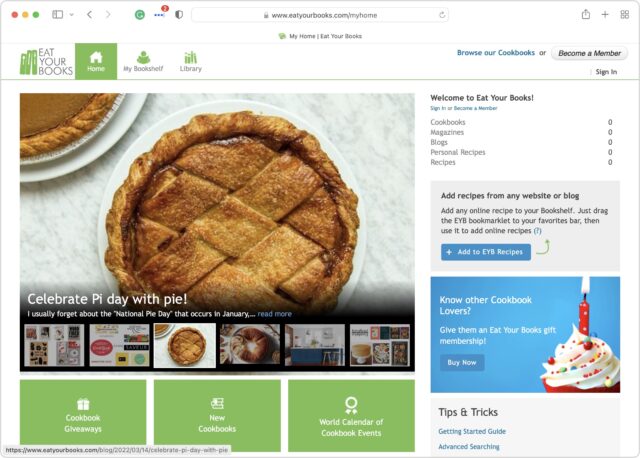
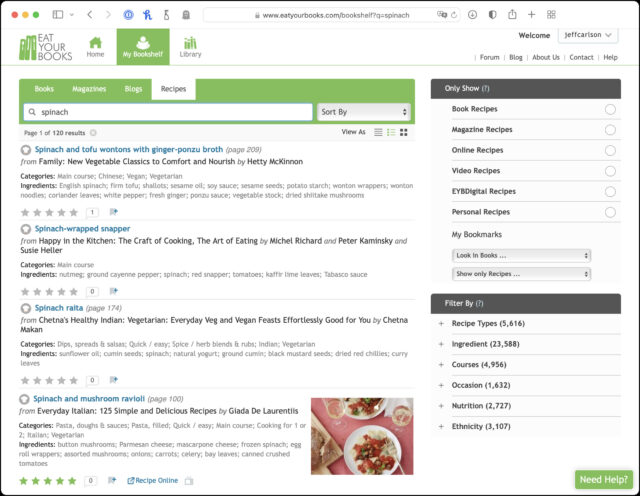
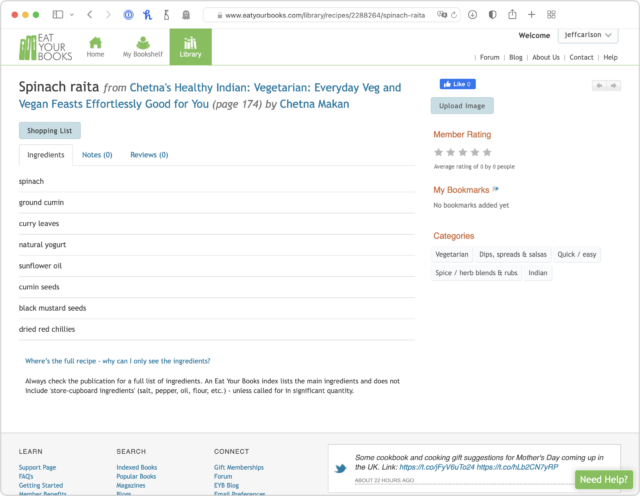
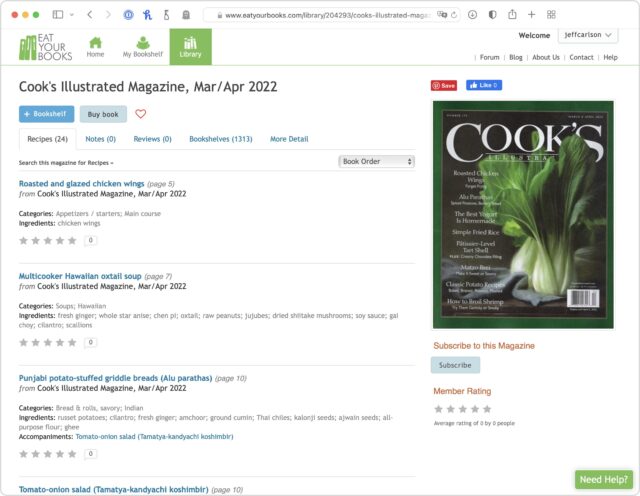
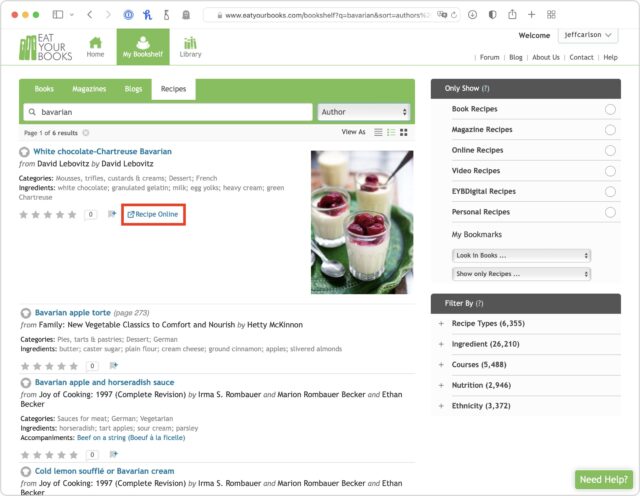
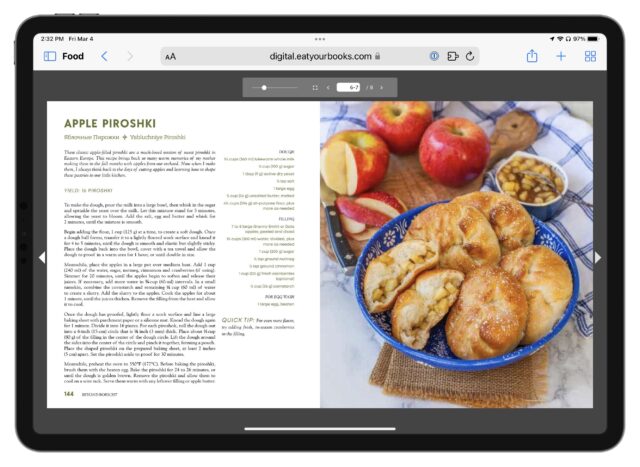
Great idea! But when I went to try it, first I got a “website not secure” warning that I had to override, and then “not found”…
Jeff figured out that the URL works if you put
wwwin front of the URL. It worked fine during editing, so something must have broke on their end in the interim and we didn’t think to test. It should be fixed now. Let me know if it continues to be a problem.This looks great! During Covid I’ve gotten tired of trying to come up with ideas for dinner. I grabbed five random cookbooks from the shelf and entered them. Just by playing around on the site I already came up with two dinners. Looks like I’ll be subscribing.
That’s exactly how I started with EYB. I’ve long felt guilty that I have some great cookbooks, but knew there were a lot of recipes I was missing.
FYI here’s my profile, if anyone is curious about my very modest library of cookbooks. It’s not all of them; some I need to dig out from the backs of cabinets. Some I’ve bought, some have been gifts. I’m proud that my copy of Les Halles is signed by Anthony Bourdain (during a special five-course dinner in Seattle prepared from the book by a restaurant chef with Bourdain mingling with the attendees). A couple I’ve never even cooked out of! Sea and Smoke, written by my friend Joe Ray, is just a gorgeous book and story, but it also has some recipes that start with, “First, dry-age a quarter cow over the winter…”
https://www.eatyourbooks.com/member/jeffcarlson
This comment:
had me laughing and choking on my coffee.
Looks like a terrific resource. Most of my 50+ cookbooks are still in boxes from a cross-country move, and I’m totally lost for recipes. Thanks!
are still in boxes from a cross-country move, and I’m totally lost for recipes. Thanks!
From the headline I immediately thought that this was going to be about web-based personal finance solutions… until I read further.
Thanks for the great review Jeff - you really summed up well what the site provides. A couple of responses:
You can add a date range of magazine issues, explained in our Help section.
I’m not sure why deemery saw a “website not secure” warning. Our SSL certificate is active and no-one else has reported this issue. If you still see that deemery, please contact us at [email protected].
@Technogeezer😄 We had a few variations and decided to use this shorter one.
Great insight into a useful resource.
Thanks for the pointer about adding a range of magazine issues, @JaneEYB. I’ve updated the article with that information.
Ok, I got all my books and seven years of my EatingWell magazines entered. Member Profile for ssteve | Eat Your Books. Sixty-seven of my ninety books are indexed. That’s pretty good considering that some of them are old and obscure. And a handful are cocktail books that are just endless compilations of recipes.
While I really like the idea of EYB, what I’d really love to have is the ability to search over their entire compendium for certain types of recipes and then buy those books.
In particular, I like making (and eating) bread and if I find myself in a bookstore (a far too rare occurrence in the last 5 or 6 years), I start looking at cookbooks for that. It would be far easier, not to mention quicker, to have the power to search over books that might never make it to a bookstore that I might browse. For that feature alone I’d sign up.
Cheers,
Jon
The website sounds like a cool idea. My wife is the cooker and baker, and I am the eater in our household. I’ll bet I have tried for 20 years to develop a database or get her to use an online service or an app for her recipes. What I finally did is create an old fashion paper binder. One off recipes that she has collected from here and there have been scanned in so I have an electronic copy but they’re in her binder. And then she has a sheet at the front of the binder to her recipes in her cookbooks. Essentially she’s created her own card catalog if you will but just in the binder format. In addition she notes when the last time she made a recipe, so she doesn’t get in a rut. Works for us.
Hi Jon - you can search the entire 2.2 million recipes in the EYB database. You don’t even need to sign-in or be a member to do that. You can also filter down to just view the 1.8 million cookbook recipes, and filter by any recipe type, ethnicity, special diet, etc. Then sort by the most buzzed-about recipes. So for instance you could view 12,000+ European bread recipes - Recipes | Eat Your Books Then narrow down further by adding ingredients or other filters. You can also view the 909 bread cookbooks we list - Cookbooks | Eat Your Books And you can view the recipe index of the 220 we have indexed by clicking the book titles.
Just finished checking out this site. This site is actually an index to cookbooks and recipe websites. What I found is that most of the recipes. are not available from the actual website but take you to other sites to purchase the recipe, a paid subscription, or to purchase the book. There are a few recipes available for free but most require some sort of payment. For instance, I did a search for “Peking” and out of 10 webpages for recipes I found only 2 free authentic recipes for it with one listing taking me to Julia Child’s recipe for Duck with Orange Sauce. As for magazines, forget about a magazine counting as a single item on your bookshelf. When doing a search for “Cooks Illustrated” each monthly magazine counted as a single item on your bookshelf and has to be added individually. This makes the concept of saving money on a subscription virtually non-existent. as 5 of the magazines is the limit of your free subscription to the site and as a subscription site the cost is $30/year along with the hassle of individually adding each monthly addition to your bookshelf. Like so many other things in life, this site is a poster site for the old adage: “You get what you pay for.” Essentially this site strikes me as being little more than being a search engine for food related recipes, cookbooks, and magazines. Personally, I can mostly accomplish the same thing by using a search engine, and a bookmarks folder for my recipe bookmarks when searching for a new recipe. If you have DevonThink (DT) you can save all your recipes you have captured via PDF from websites as well as your own into a folder, Index them with DT, tag them by categories and use DT for any kind of search, including by ingredient if you have OCR’ed the recipe with the built in DT tool instead of endless paying forever, mostly for the privilege of discovering recipes to purchase. DT while expensive (discounted for Tidbits members), is pay once except for infrequent major upgrades at discount with immense capabilities for many needs.
Hi jweil - I’m afraid you have misunderstood the purpose of Eat Your Books. It is not a recipe site. It is a service to make finding recipes in your own collection of cookbooks and magazine quick and easy. You create a Bookshelf of the cookbooks you own and the magazines you subscribe to. Then when looking for a recipe you search your own collection - using ingredients, recipe type, ethnicity, special diet, etc. We do provide links to some full recipes (about 370,000) from cookbooks, magazines and online sources. These are free. But if you want a search engine of your own Bookshelf then that requires a Premium membership - $2.50 a month for an annual membership. Although you describe the site as “little more than being a search engine for food related recipes, cookbooks, and magazines” that is exactly the service that is needed for people who own a lot of cookbooks and magazines. Your suggestion of indexing them all yourself in order to save $2.50 per month may be an option for people with a lot of spare time and who love data entry, but most are happy to have us do all the indexing (2.2 million recipes to date).
Thank you for your clarification. Unfortunately, the original writeup of the service left me with the impression that all the available recipes could be downloaded and it was certainly not clear to me that with magazines each issue of a magazine counts as a single book and that if you want access to recipes from your website for a magazine, each issue has to manually added to your bookshelf.
Would it be a fair assumption to assume that once you have added indexed material to your bookshelf with a paid subscription, should you decide to revert to free access that downloading of recipes in your paid subscription beyond 5 items on your bookshelf would no longer be available for download through your bookshelf?
With a Premium membership you can add all indexed issues of a magazine to your Bookshelf in one move, explained here in our Help - https://bit.ly/3qCnxdy Most magazines put up the recipes on their websites, with free access. Some are immediate, some are within a couple of months. We provide links to every recipe that a magazine puts online, unless it is behind a paywall.
If you want to convert a Premium membership to a Free one, you would first need to reduce your Bookshelf to 5 items. Then with your Free membership you can add as many Online Recipes to your Bookshelf as you wish as well as any of the indexed blogs/newspaper columns (a total of almost 370,000 recipes). But I want to clarify that we do not offer “downloading of recipes”. We provide links to the source and you can then save from there in whichever way you save online content.
Sorry you got that impression! I thought we were pretty clear with:
and
Thank you for the clarification. So, what I get from this is that the site is an index to a number of recipe books and websites with a minority of sites that offer free downloads to have accessible recipes from your site. If a book or magazine is subscription based you have to purchase the subscription to get the recipe or buy the book if it is a book.
Its primary use seems to be an available recipe index to recipe books and magazines you already own becoming fee based if you wish to create a personal library larger than 5 items as opposed using your sites search engine to find the location of recipes in your own physical library.
Kindly correctly me if I am mistaken that this essence it is a tool of convenience, of having a ready-made index covering the publications of publications you already own and paying a fee for life for using this convenience if you own more than 5 publications that you wish to have included in the index. If a publication you own which you wish to index is not already included, the user needs to manually add that index, one recipe at a time to your database; then pay for the privilege of using it if you wish to have more than 5 publications accessible; with the exception being the limited number or recipes that are already in your database that are offered for free by their respective websites.
Please correct me if I am wrong, but this comes across to me as asking existing users to volunteer and pay for the privilege of improving your website by indexing their own publications that are currently not included, which benefits your other users and subscription base, while your company reaps profits from the contributing users time and efforts with no compensation for it.
Additional Thoughts and Experience: I just searched your index for a couple of recipe books I already own. They are indexed and list the name of the recipes but no page number and no way of downloading the recipes with the only option available being to buy the book that I already own. If I need to access the recipe, I need to find the book in my collection, and find the recipe in the books’ own index, which I would be doing without your website. If I wanted to print the recipe so as to not risk soiling the book when cooking, I would have to write it out by hand or scan the recipe page and print it. So exactly how is your website helpful to me in such instances?
If you are a Free member and you index one of your cookbooks, it is added to your limit of 5. Your view is that we are exploiting members who spend time indexing their own cookbooks. Our view is that we offer our indexing tools and database to allow members to add less popular books to their recipe searches. We also proofread those indexes as we need to maintain the quality of our data. So we spend time and money on indexes of books we would never index ourselves, that are sometimes only owned by that member, or Free members who pay nothing to use our service.
I’m not sure why you think people shouldn’t pay for life a tool of convenience. New books and magazines are indexed every day thereby increasing the number of recipes in our members searches. Not just those newly published but also older books. Those are costs that we need to cover with subscription fees. We do not have advertising nor do we exploit our members data or activities. There are lots of sites with free recipes, which it sounds like you require. You also are free to create your own database of all your recipes. Perhaps then you’ll see how much work it involves and that it’s worth $2.50 a month!
In response to Additional Thoughts and Experiences:
Again, we are not a recipe site and we do not offer “downloads of recipes”. We help our members find recipes and they then use their book or magazine to cook from. Of course you can instead search every book you own. But a search on EYB gives you better and faster results - pulling down all your books and looking through each index is very time consuming. And the back of the book index does not list every ingredient (EYB goes right down to herbs and spices) or list the categories that EYB has – recipe types, ethnicity, special diet, meal/course and season/occasion. And the EYB mobile site lets you search your cookbooks when you are away from home (like in the grocery store or the farmers market).
Downloads of recipes would be a breach of the publisher and author’s copyright. There if no foolproof way for you to prove you own a book and even if you could, publishers are unlikely to allow that option.
Every book indexed in the past seven years has page numbers. We didn’t originally add them as a book is indexed once from the most popular edition and then all other editions are linked to it so the data is shared. We felt it would be confusing if your edition had a different layout and page numbering. However since it’s not so common that books change layout we have added page numbers since 2015. We are working our way through the books added in our first 5 years adding missing page numbers. It’s unfortunate that the two you looked at were early indexes. Maybe add some more recent books?
That’s exactly it.
If you don’t cook a lot, it really doesn’t help much. If, like my wife, you have hundreds of cookbooks filling several bookshelves near the kitchen, this kind of index can be extremely convenient. If you’re thinking about what to make, you probably aren’t going to thumb through the table of contents on a dozen books in order to find something - you’re probably going to go to one or two favorites and ignore the rest. A search engine like this will help you discover/remember everything else in your collection.
Whether it’s worth the subscription fee is, of course, a matter of personal opinion.
Thank you for clarifying this for me. In my case I have a bookcase in my home office with 5 4’ length shelves filled tightly with cookbooks; some of the smaller books filled double depth. I have not purchased a new one in many years preferring to download and print recipes that I save from on-line or purchase eBook’s which allows me to print pages or save them to a mobile device to use in the kitchen. Additionaly many of my books, abet older books, are not indexed on EYB. For me this site is next to useless as many of my recipes are not from websites that are included in EYB and I can use the free App, Microsoft One Note to save and search for recipes on my computer or most any mobile device with the list of ingredients and recipe included as well as use it in the kitchen. If I want a list of ingredients on my phone when I go shopping, I use Alexa and create the list by speaking it. I can also check off things on my list as I put them into my cart. No paper involved. One Note can also capture and organize website content while browsing. A quick search indicated about ⅓ are indexed. For me this site will do little to improve my productivity in finding and using recipies - which is why I choose to remove my registration for it.
Membership now deleted.
Obviously no service is right for everyone. For me, though, Eat Your Books is easily worth $2.50-$3.00 per month. Just in the few days I’ve used it I’ve found and made recipes in my cookbooks that I never would have found otherwise. I’ve already started tagging others with the “I want to make this” bookmark. My wife and I both enjoy cooking but over the course of the pandemic I really lost the motivation to find and try new recipes. This has rekindled my interest in cooking and exploring recipes. I’m grateful for that.
Jeff, glad you discovered Eat Your Books. You and I have some cookbooks in common, but I’m somewhat embarrassed to admit that I have more than 275. Of course, I’ve been collecting since 1970. I found out about Eat Your Books in July 2014 and joined immediately. Eat Your Books works great for me combined with a couple of paid website memberships (ATK, NYT and ChefSteps) and lots of free ones (Serious Eats, several others). The Paprika app is great for storing the online recipes. Some people will object to paying for that many services, but I know a lot of people who spend a lot more on their hobby than I do, such as golfers and skiers.
Hey Jeff - just read your review of EYB not to be confused with CYB - in any case your mention of Seattle made me reply to say I’m waving from Puyallup!
I love this so much! I am a cookbook collector and I have lots and lots of them. I tried to do this on my own many years ago by photocopying the indexes to cookbooks. It was overwhelming and way too time consuming for me. Being able to search recipes in the books I have invested in makes me very happy.
I already created an account on their website and I entered some of my favorite cookbooks! I cannot wait to enter all my cookbooks and get cooking! Thank you!
As the owner of way too many cookbooks, including lots of old or obscure bread books, this site saves me lots of time and effort. Unfortunately it also costs me money as there are periodic notices of upcoming releases. Without those I might remain unaware of many tempting cookbooks and might not buy them. Thanks, I think.
That’s definitely the danger. “I already have plenty of cookbooks.” [Sees shiny list of new cookbooks coming out.] “I need more cookbooks!”
Sorry to bump this old conversation, but I wasn’t sure of a better place to add this comment: According to a few twitter/reddit threads, it seems that the cooking/recipe website, Condé Nast’s Epicurious.com, changed its operating model without notifying users, leading to many users losing their personally-curated lists of recipes, some of which were years in the making. Previously free content now is behind a paywall, and evidently many users’ recipe hand-curated lists/folders have been removed, even though the original recipes may remain on the site.
I can’t personally vouch for the details, but it is a good reminder to make sure you consider how you might maintain access to any truly important information – including your favorite recipes – that you store in a cloud-based service in case the cloud service changes its rules or disappears.
This is exactly why I’ve used Paprika for years to save my online recipes database. The New York Times also now requires subscription to use their recipe website. Interestingly, I also discovered that Paprika can read and save the recipe, even if it is covered by a paywall subscription pop-up.
Paprika iOS App
Yes, I second the use of Paprika (iOS and MacOS). And also found out that even though a pop up shows that you need a subscription to NYTimes Cooking (I already have a subscription to the e-paper) it will grab the recipe that was tantalizingly shown to you while you are reading the regular NYTimes online.
Love, love love Paprika.